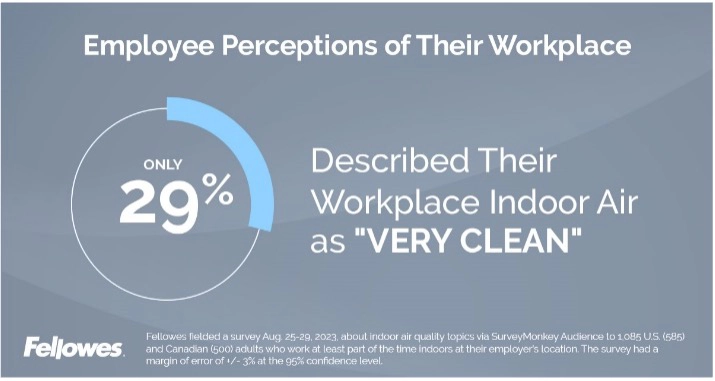In observance of the International Day of Clean Air on Sept. 7th, Fellowes, a family-owned company providing trusted workplace solutions for 106 years, today announced results from a recent U.S. and Canadian survey around workplace wellness. This survey, canvassing 1085 U.S. and Canadian workers who work on-site indoors at least one full day a week, sheds light on the salient issue of indoor air quality (IAQ) in the workplace.
Key Survey Findings:
1. Deterioration in IAQ Perception: A mere 29% of respondents (comprising 33% of Americans and 25% of Canadians) characterized the air quality in their workplace as "very clean." This is indicative of a noteworthy decline from the 36% reported in a 2022 Fellowes survey.
2. Advocacy for Clean Air: 91% of respondents expressed that clean air should be a fundamental right for all workers, underscoring the pressing nature of addressing IAQ concerns.
3. Performance Implications: The vast majority of respondents (89%) reported that clean indoor air helps them perform their best at work, which reflects research led by the Harvard T.H. Chan School of Public Health that links clean indoor air to increased cognition and productivity.
4. Identified IAQ Factors: Respondents whose workplace was not considered very clean identified several factors contributing to poor IAQ, including:
- Stagnant air or inadequate circulation - reported by 35% of these respondents
- Humidity levels - 33%
- Manifestations of mold, stains, dust, and airborne particulates - 25%
- Perceptible odors - 25%
5. Priority for IAQ over Workplace Amenities: Both U.S. and Canadian workers place high value on a clean indoor workspace over conventional workplace perks, ranking it as their foremost preference for workplace enhancements. Respondents ranked six options in the following order of importance:
- Clean indoor workspace, including clean air
- Health allowances and/or stipends for gym memberships and exercise equipment
- Free coffee/snacks
- Free fitness club/gym membership
- Social gathering areas, including pool tables, foosball, etc.
- Happy hours/social events
6. Concerns Impacting Job Retention: Around one in three (31%) respondents stated they would consider leaving their employment due to concerns associated with poor indoor air quality.
With the average person spending 90% of their time indoors, according to the Environmental Protection Agency, cleaner indoor air should be a critical focus for businesses on International Day of Clean Air. Employers that invest in air purification with HEPA filters, upgraded HVAC systems, and improved ventilation can protect workers from airborne viruses, including COVID-19 and its variants, bacteria, pollution, allergens, and volatile organic compounds (VOCs).
Unfortunately, only 37% of surveyed workers reported that their employer had made IAQ improvements in the last year. Among employers that did make IAQ improvements, the top change that employees noticed was the addition of air purifiers (59% of respondents who noticed an employer’s IAQ improvement). Air purification systems help to improve a space’s air quality while also providing visual proof to employees that their workplace is focused on well-being. Some systems, including Fellowes' new Array air quality management system, can also provide employees with real-time insights into the quality of their air through data visualization and a shared online community dashboard.
“Workers today are more knowledgeable of the risks associated with poor air quality and are looking to their employers to make the necessary improvements to keep them safe and productive at work,” said Arti Lyde, Global General Manager, Air Quality Management at Fellowes. “With employees aware of the effect air quality has on their productivity and their health—even going so far as to consider leaving their job because of it—businesses should invest in air quality improvements as a way to invest in their workforce.”
The increasing public demand for improved IAQ led to the release of the first-ever standard for controlling infectious aerosols and maintaining healthy indoor air quality in June by ASHRAE, an organization dedicated to advancing human well-being through technology in building systems, energy efficiency, indoor air quality, and refrigeration. ASHRAE guidelines recommend a combination of clean air delivery rate and filtration levels equivalent to five air changes per hour (eACH) and higher depending upon the space. The U.S. Centers for Disease Control (CDC) has also released similar guidance for IAQ, and encourages the use of HVAC systems with MERV-13 filtration or better, as well as HEPA air purification systems, to maximize air cleanliness.
Table of Survey Results by Country
| Topic Measured | U.S. + Canada | U.S. Only | Canada Only
|
| Described indoor workplace as “very clean” | 29% | 33% | 25% |
| Said clean indoor air helps them perform their best work | 89% | 87% | 93% |
| Said clean indoor air should be a right for all employees | 91% | 88% | 95% |
| Would consider leaving a job over poor indoor air quality | 31% | 34% | 28%
|
Fellowes.com

